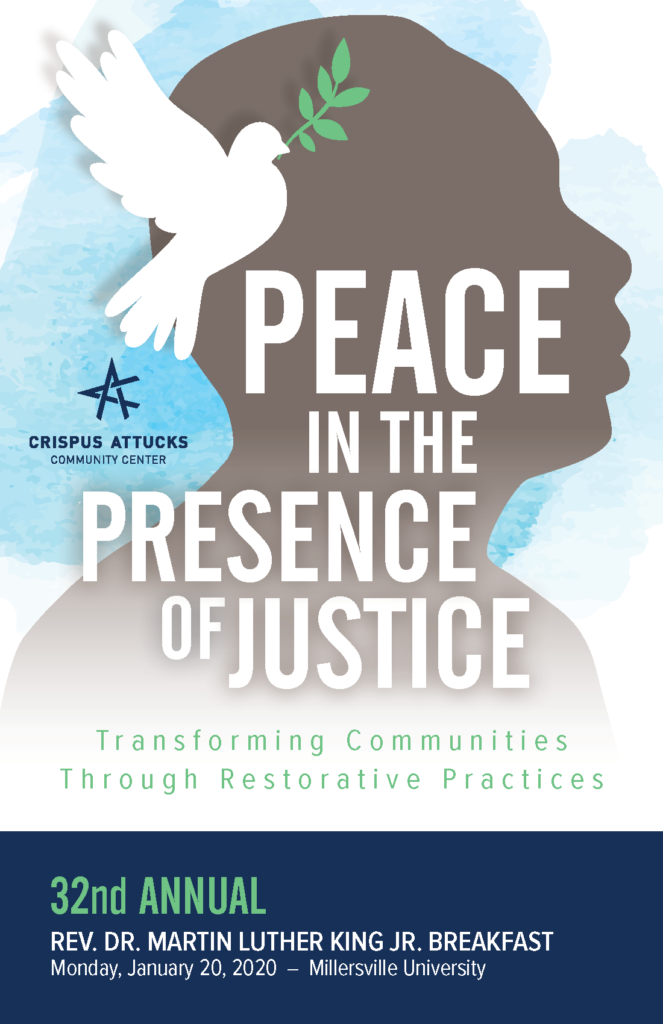32nd Annual Rev. Dr. Martin Luther King Jr. Breakfast – Peace in the Presence of Justice: Transforming Communities Through Restorative Practices
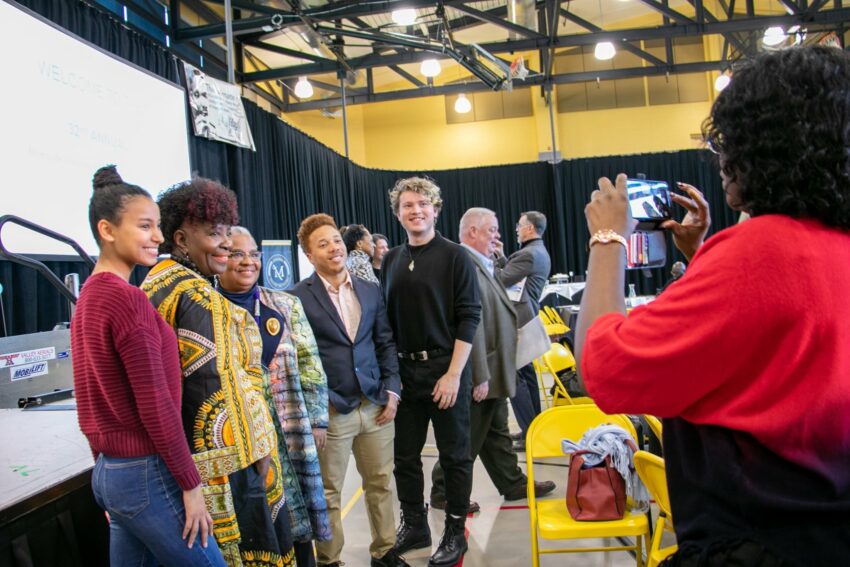
Click here to download the program (.pdf)
On Monday, January 20, 2020 the Crispus Attucks Community Center and Community Action Partnership of Lancaster County held the 32nd Annual Rev. Dr. Martin Luther King Jr. Breakfast to honor the legacy of Dr. Martin Luther King Jr. About 700 people attended the event.
“It’s important to celebrate because it’s a reminder that we’re required to do something, so what we really need to be paying attention to while this is a day that we bring honor to his work,” said Vanessa Philbert, CEO of Community Action Partnership.
We invite you to join us in helping to foster a vibrant, diverse and prosperous community, rich with cultural heritage and educational opportunities, by making a gift to Crispus Attucks Community Center.
Your gift will help CACC improve the quality of life for youth and families in Lancaster by providing services that promote community prosperity and physical and mental health, and by offering programs and cultural events which preserve the African American heritage. Click here to donate.
You can relive the day here.
RESTORATIVE JUSTICE: In Context
The theme of our program today is “The Presence of Justice: Transforming Communities through Restorative Practices.”
Restorative Justice is an approach where justice systems are designed to heal and repair communities after a crime has been committed, not simply punish the offenders. This often involves discussions between offenders and victims, apologies, and amends. The goal is to help victims process their feelings, and to help offenders understand the impact of their actions and discourage them from causing additional harm. While the majority of this research was developed in the 1990s, Dr. King shared many thoughts on the relationship between justice and peace which remain relevant in our community and in our nation.
In his speech accepting The Nobel Peace Prize in 1964, Dr. King emphasized the importance of taking a healing approach when resolving disputes:
“Man must evolve for all human conflict a method which rejects revenge, aggression, and retaliation. The foundation of such a method is love.” ― Martin Luther King, Jr., Nobel Peace Prize Acceptance
In an address in Montgomery, Alabama in 1965, he spoke about how we are accountable to each other, and ourselves, for the methods we use to deal with conflict, and how we cannot achieve peace through violent means:
“We must come to see that the end we seek is a society at peace with itself, a society that can live with its conscience.”
― Martin Luther King, Jr.
Finally, in The Autobiography of Martin Luther King, Jr. published in 2001, Dr. King gives a beautiful summary of the guiding principle of restorative justice, stating simply:
“Justice at its best is love correcting everything that stands against love.” ― Martin Luther King, Jr.
KEYNOTE SPEAKER: DR. FANIA DAVIS
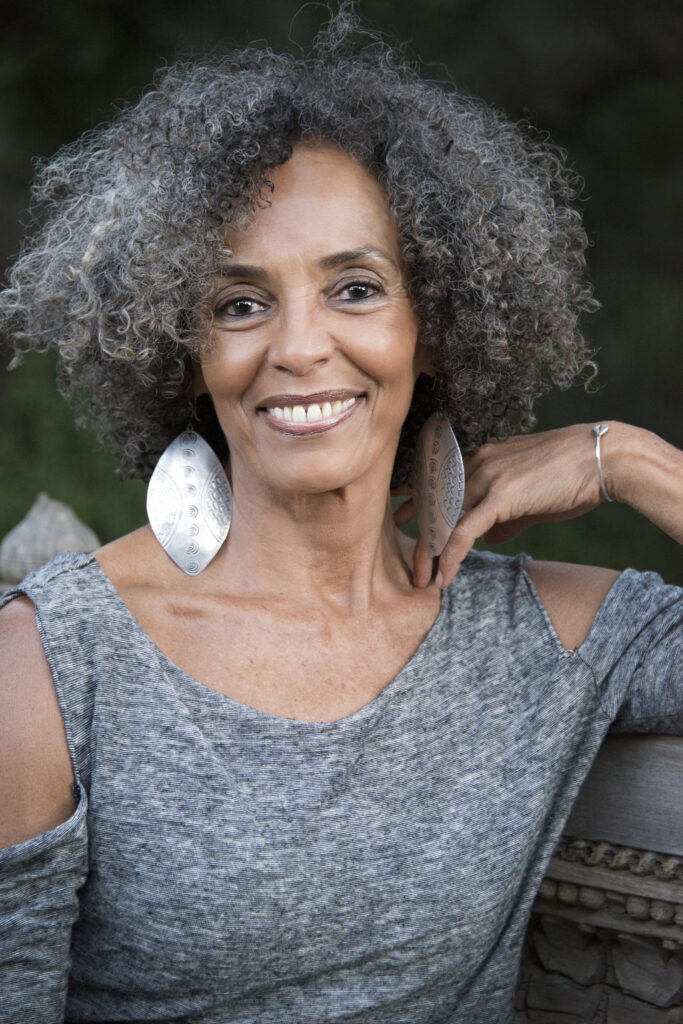
Today’s special guest speaker is Dr. Fania Davis. Named one of the Los Angeles Times’ New Civil Rights Leaders for the 21st Century, Dr. Davis is a leading national voice on restorative justice.
She is a long-time social justice activist, civil rights trial attorney, restorative justice practitioner, writer, professor and scholar with a PhD in Indigenous Knowledge. Coming of age in Birmingham, Alabama during the social ferment of the civil rights era, the murder of two close childhood friends in the 1963 Sunday School bombing crystallized within Fania a passionate commitment to social transformation.
For the next decades, she was active in the Civil Rights, Black liberation, women’s, prisoners’, peace, anti-racial violence and anti-apartheid movements. Studying with indigenous healers, particularly in Africa, catalyzed Fania’s search for a healing justice, ultimately leading Fania to bring restorative justice to Oakland, California.
Founding Director of Restorative Justice of Oakland Youth (RJOY), her numerous honors include the Ubuntu award for service to humanity, the Dennis Maloney Award for excellence in Youth Restorative Justice, World Trust’s Healing Justice award, the Tikkun (Repair the World) award, the Ella Baker/Septima Clark Award, the Bioneer’s Changemaker Award, and the Ebony POWER 100 award.
She is a Woodrow Wilson fellow and the author of “The Little Book of Race and Restorative Justice: Black Lives, Healing, and US Social Transformation.”
REFLECTIONS
 MARQUIS LUPTON, CACC Director
MARQUIS LUPTON, CACC Director
I along with the staff at Crispus Attucks and the Community Action Partnership would like to thank you for attending today’s breakfast. To quote Dr. Martin Luther King, “Life at its best is a creative synthesis of opposites in fruitful harmony. The beauty of genuine brotherhood and peace is more precious than diamonds or silver or gold, and that it is love and only through love, that will save our world and our civilization, love even for our enemies.”
Today we not only celebrate the legacy of Dr. Martin Luther King, but also celebrate the legacy of this great breakfast. In July, I was hired to usher in new ideas for the center and reinvigorate a passion that was waiting to burst back on the scene! As a youth running around these neighborhoods, we would visit Crispus Attucks, as well as Bethel Cultural Center, and the Boys and Girls Club when it was on Rockland Street. Being able to grow and mature within these iconic buildings has helped shape me.
To date, the center has received more than $100,000 worth of work and repairs for virtually nothing. Community members and partners have lined up to lend a helping hand to Crispus Attucks. In October of last year, organizations like Charter Homes, TC Backer Construction, the Dominican Council of Lancaster, the TCP network, and City Hall all gave their time, money, and resources to build up our center. We received a new roof (thanks to TC Backer), new flooring, and new paint all around the center. A room has been converted to a digital radio station. Lounge areas were created downstairs (one for adults and another one for kids), and we received upgrades to the kitchen and café, to go along with new toilets and stalls, shelving units, and gutter systems. All of this could not have been done without the love and care of our community members and partners!
 VANESSA PHILBERT, CAP CEO
VANESSA PHILBERT, CAP CEO
MLK poses a timeless question that I ask myself often – ‘What are you doing for others?
What AM I doing for others? This question has guided my life and career, and has encouraged me to daily reflect and challenge myself to create intentional moments to care for people and for our community. I believe that a simple but powerful act of kindness can resonate throughout our circles.
As we move forward in 2020, let’s keep a clear focus on the needs of others and how we can empower each other to have courageous conversations followed bythoughtful and strategic action.
Thank you so much for attending today’s breakfast, and here’s to living MLK’s legacy!
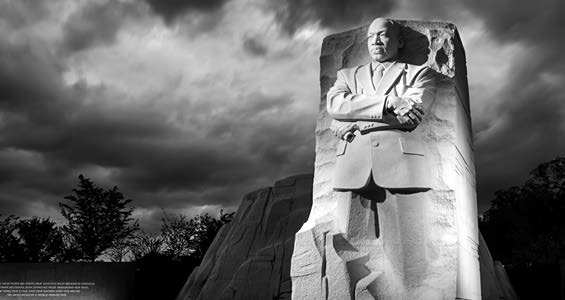
ESSENCE OF HUMANITY AWARDS
The Essence of Humanity Award is intended to recognize those individuals who – beyond the requirements of their work – demonstrate remarkable courage, love, strength, determination, encouragement, inspiration, and persistence when dealing with adversity, and to recognize those who demonstrate the spirit of caring and provide inspiration to such individuals on a daily basis. This award is made possible by the High Foundation.
Phil & Rhea Starr, nominated by Dr. Leroy Hopkins
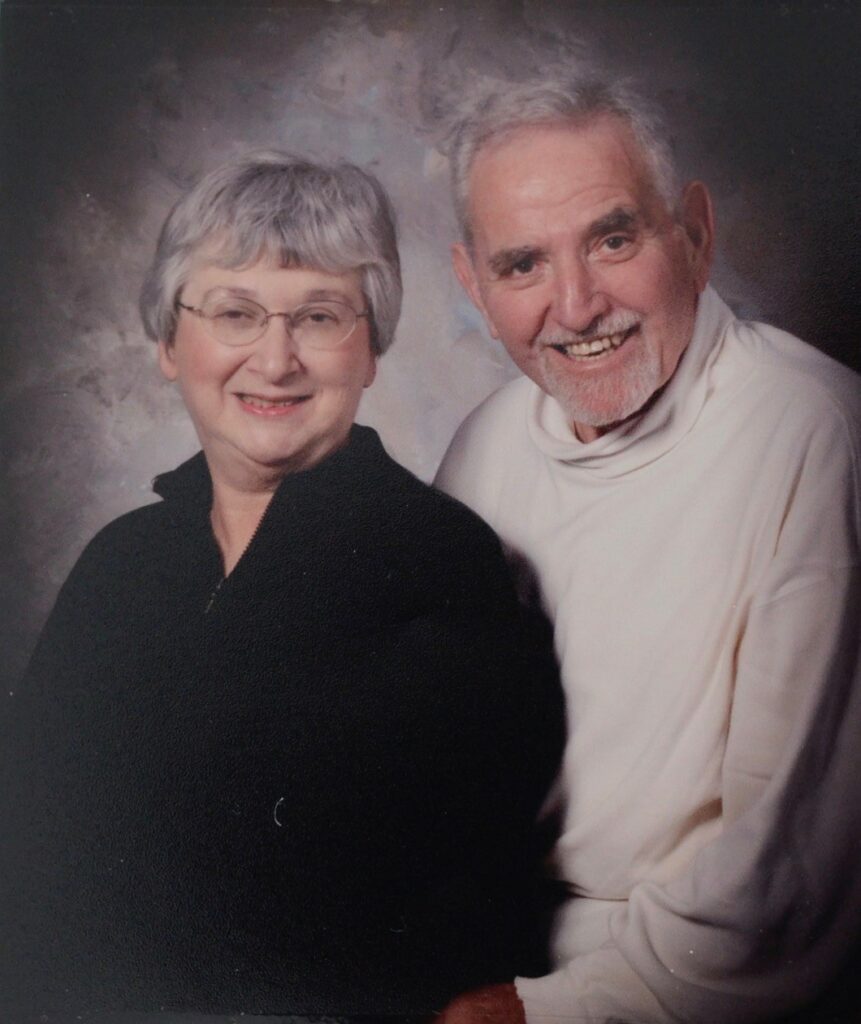 Since the 1970’s both Rhea and Phil Starr have been advocates for women, children, and the economic disadvantaged. Phil began his work in Lancaster as a social worker at the Lancaster Cleft Palate Clinic. After serving in that position, he took up the difficult task of creating a foundation for the Southeast Lancaster Health Center (now Lancaster Health Center). During his tenure there from he increased the center’s endowment from $900,000 to $2.3 million. Part of that effort was leading a $768,000 capital campaign. Phil also effectively led the transition of the facility into its new headquarters where the clientele served increased astronomically.
Since the 1970’s both Rhea and Phil Starr have been advocates for women, children, and the economic disadvantaged. Phil began his work in Lancaster as a social worker at the Lancaster Cleft Palate Clinic. After serving in that position, he took up the difficult task of creating a foundation for the Southeast Lancaster Health Center (now Lancaster Health Center). During his tenure there from he increased the center’s endowment from $900,000 to $2.3 million. Part of that effort was leading a $768,000 capital campaign. Phil also effectively led the transition of the facility into its new headquarters where the clientele served increased astronomically.
Not content to just serve the health needs of the community, Phil successfully ran for election to the School District of Lancaster board where he served one term. He was an outspoken advocate for children and taxpayers in the district. He and his wife became partners in a store selling educational toys for children while being engaged in the activities of running the health center and serving on the school board. After his retirement from the health center, he became the director of development for Harb-Adult which provides transitional housing to economically disadvantaged individuals.
Phil was a member of the African American Coalition, the Unity Coalition, the United Way Government Relations Committee, and the United Way Leadership Council. He also found time to serve as director of Jewish Family Services. Phil’s advocacy and his passion for tolerance and social justice have been recognized in the past: he received a Red Rose in 1997 and in 1995 was the recipient of the Harry C. Robinson, Jr. Humanitarian Award given by the Lancaster Human Relations Committee.
Rhea Starr began her work in Lancaster as a child care advocate at the YWCA. Rising through the ranks, she became a program coordinator and then child care and public affairs program director. In 1987 she accepted a new challenge to be field consultant for YWCA USA and management consultant to the 37 YWCA’s in the Commonwealth. From 1987 to 2002, Rhea served in various positions (management consultant, director of association network services, interim associate executive director, and director of child care services and advocacy) for YWCA USA. In 1996 the PA Council of YWCAs received the Racial Justice Award for its work ameliorating race relations. That award was dedicated to Rhea for her work with the council. She is also the inaugural recipient of the Women’s Coalition’s Jean Royer Kohr Award for “a strong sense of self-identity, a sensitivity to injustice, a vision to reach her goals and to help others reach their goals, perseverance and inner strength, all of which leads to the betterment of people, particularly women.” In 2002, she retired and did consulting work in Lancaster, primarily for the United Way of Lancaster’s Success by 6 program.
Both Phil and Rhea Starr have devoted their time to many causes including peace, minority rights, and women’s issues. Phil was an active Democratic party member and Rhea was a member of the League of Women Voters. Both have taken stands of conscience that have been contrary to some sections of our community. In all cases it is clear that they have been concerned with doing the right thing and helping the underprivileged and those who have been discriminated against in our society.
RUBY PAYNE COOK AWARDS
Ruby M. Payne Cook served for nearly 30 years as the first Executive Director of Crispus Attucks Community Center. This award was established in memory of her commitment and dedication to the Center and the African American community. It is given annually to those who have dedicated their time and energy to serving the Center and the surrounding community.
 Dr. Maria Corley & Kiana Corley
Dr. Maria Corley & Kiana Corley
When Kiana Corley (a local singer/songwriter) saw that The Crispus Attucks Center had been forced to cut back their meal service from five to two days a week, she told her mother, Dr. Maria Thompson Corley (a Juilliard-trained concert pianist) that she wanted to do something about it. Given their musical backgrounds, of course that “something” was a benefit concert. The Corleys gathered their musician friends and colleagues to perform a concert in June which featured a variety of performances from choral to jazz to a speech from Shakespeare. After the success of their first concert, Maria and Kiana organized an encore performance at the Ware center. Both events combined raised more than $5,000 dollars for the meals program at the center. Today they are receiving the Ruby Payne Cook Award for their support of the meals program, as well as their vision for the larger impact that individuals can have on their community.
 Rochelle Williams
Rochelle Williams
In the spring of 2019, CAP and Crispus Attucks made the decision to help local businesses through offering social enterprises affordable space at the center. The first tenant of this new program is Rochelle Williams and her dance company RebelChic Dance Co. In our community, there are many talented young people who are not being artistically nurtured; RebelChic’s mission is to re-direct their focus, break down emotional barriers and tap into their hidden talents. At the center, RebelChic offers dance and performance training in various styles, including hip hop, lyrical jazz, tap, hip hop jazz, and breakin. RebelChic placed in the top 5 of the ASSETS Great Social Enterprise Pitch and is currently the halftime entertainment for a semi-pro basketball team.
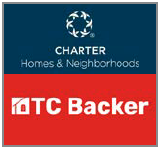 Charter Homes & TC Backer Construction
Charter Homes & TC Backer Construction
Last fall, Charter Homes coordinated more than 60 volunteers to participate in their Make a Difference day, and Crispus Attucks was the recipient of this major renovation project. From painting, plumbing and electrical work, to exterior updates, landscaping, new flooring and so much more, the Charter Homes & Neighborhoods team made their mark at the Crispus Attucks Community Center, and helped revive a staple in Southeast Lancaster. Because of the generosity of TC Backer, the Crispus Attucks Community Center can now celebrate its FIRST-EVER new roof and gutter system.
Now that the gutters and downspouts are in working order, they will protect the center from expensive damage from the elements. TC Backer donated over $100,000 worth of materials and labor for the full roof replacement.
WHO WAS CRISPUS ATTUCKS?
Crispus Attucks (c.1723—March 5, 1770) was the first casualty of the Boston massacre in Massachusetts. His father was an African-born slave and his mother a Native American.
His life up until he was 27 years old is a mystery, but in 1750, Deacon William Brown of Framingham, Massachusetts, placed a notice in the Boston Gazette that his slave, Attucks, had run away. Brown offered a reward of 10 pounds as well as reimbursement for any incurred expenses to anyone who caught Attucks. No one captured Attucks, and by 1770, he was working as a sailor on a whaling ship.
On March 5th, he was having lunch near Boston Common along with other sailors from his ship, waiting for good weather so they could set sail. When he heard a commotion outside, Attucks went to investigate, discovering a crowd of Americans clustered near the British garrison. The crowd had gathered after a barber’s apprentice accused a British soldier of not paying for a haircut. The soldier struck the boy in anger, and a number of Bostonians, seeing the incident, gathered and shouted at the soldier. Other British soldiers joined their comrade, and they stood, as the crowd grew larger.
Attucks joined the crowd. He took leadership of the group, and they followed him to the custom house. There, the American colonists began throwing snowballs at the soldiers guarding the building. The British soldiers opened fire on the crowd, killing Attucks first and then four others. Attucks became a hero to the colonials during the American Revolution. They saw him as gallantly standing up to abusive British soldiers.
Attucks became a hero to African Americans. He is widely believed to be the first person who gave his life for American independence, despite being born into the oppressive system of American slavery. Dr. King recognized Attucks in his book, “Why We Can’t Wait,” for his courage and for the role he played in the history of our nation.
To make a gift to the Crispus Attucks Community Center, Click here to donate.
About Crispus Attucks Community Center
Since 1927, the Crispus Attucks Community Center has been an anchor in Southeast Lancaster City. The organization has a proud history of providing educational and cultural programs to celebrate African American heritage, serving meals to individuals in need, and focusing on youth education and leadership development. Crispus Attucks takes immense pride in its mission to improve the quality of life for youth and families in Lancaster by providing services that promote community prosperity, physical and mental health, and by offering programs and cultural events which preserve the African American heritage.
About the Community Action Partnership (CAP) of Lancaster County
The Community Action Partnership is Lancaster County’s largest anti-poverty organization, helping low income families move toward self-sufficiency. CAP’s service profile interrupts inter-generational poverty with programs that support families and individuals at every age and place in life, in the areas of education and child development, health and nutrition, household stability and safety and empowerment. For more information, visit www.caplanc.org.



